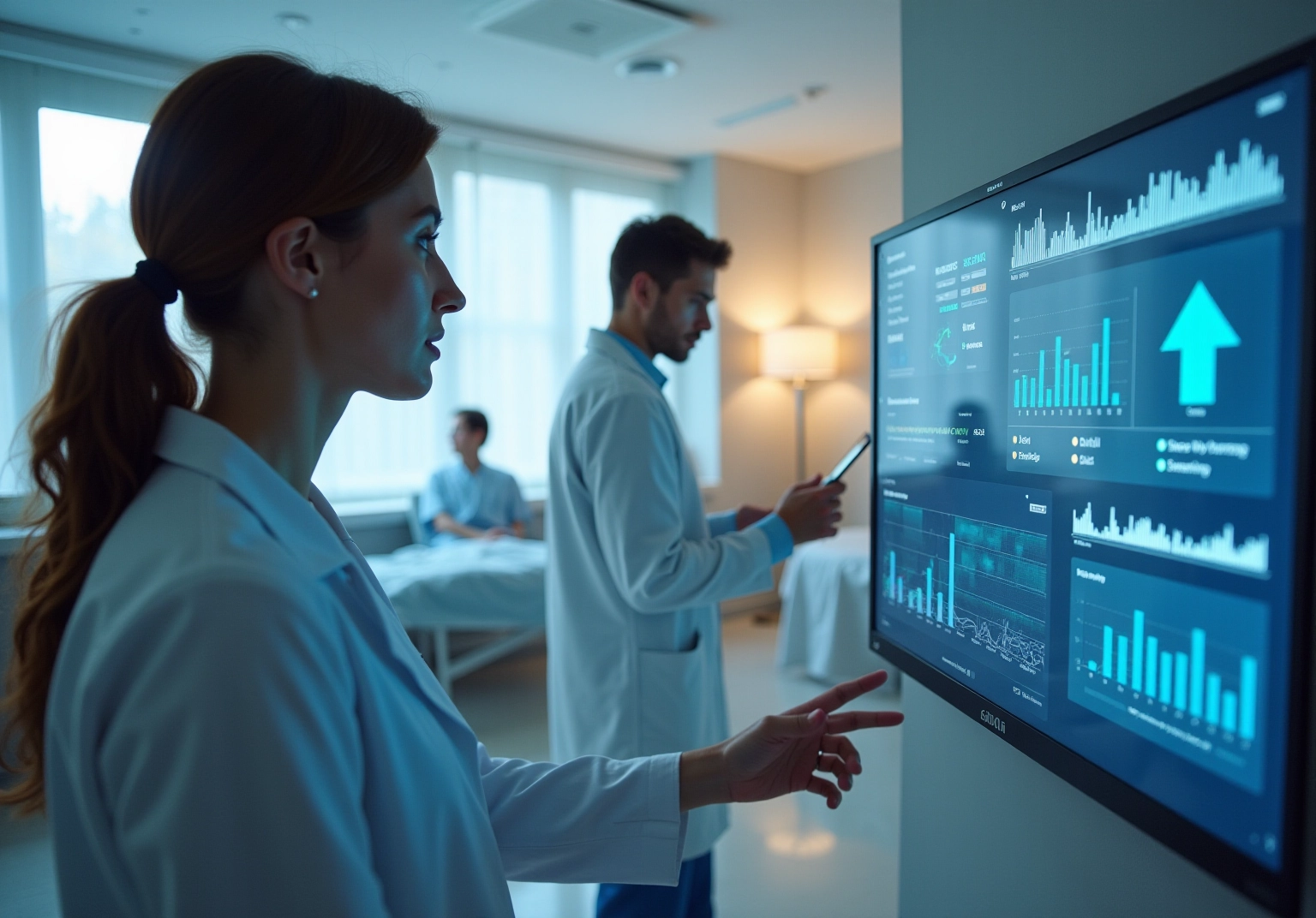
The article explores the transformative applications of AI in healthcare that significantly enhance patient care and operational efficiency. Key innovations such as AI-driven predictive analytics, virtual health assistants, and genomic medicine are at the forefront of this evolution. These technologies not only improve diagnostic accuracy but also streamline administrative processes and personalize treatment plans. The result is a marked improvement in patient outcomes and a more efficient healthcare delivery system. This is evidenced by increased utilization rates and positive feedback from users, underscoring the critical role of AI in modern healthcare.
The integration of artificial intelligence in healthcare is not merely a trend; it signifies a transformative shift poised to redefine patient care and operational efficiency. As healthcare systems confront escalating demands and complexities, AI presents innovative solutions that enhance clinical decision-making, streamline processes, and improve patient outcomes.
Nevertheless, with the swift evolution of these technologies, one must contemplate: how will these advancements shape the future of healthcare delivery, and what challenges will arise in their implementation?
The Inferscience HCC Assistant addresses a critical challenge in healthcare by leveraging sophisticated AI algorithms, which exemplify the AI uses in healthcare for automating the collection and analysis of clinical data. This innovation provides precise coding suggestions directly at the point of care, simplifying the HCC coding procedure and significantly enhancing coding precision. As a result, medical professionals can optimize their Risk Adjustment Factor (RAF) scores and secure maximum funding from Medicare Advantage beneficiaries. By alleviating the administrative burdens typically faced by medical personnel, the HCC Assistant empowers providers to concentrate more on patient care while ensuring compliance with coding regulations.
Notably, MultiCare has reported a remarkable 16% increase in utilization, managing an additional 1,600 cases, which underscores the tangible benefits of AI uses in healthcare for enhancing operational efficiency. Furthermore, the HCC Assistant has garnered favorable reviews for its usability and efficiency. Users consistently commend its ability to streamline the coding process and improve accuracy, solidifying its role as an essential tool for enhancing coding accuracy and compliance within the medical field.

The ai uses in healthcare, such as AI-driven predictive analytics, address a critical challenge: the ability to analyze vast amounts of individual data to identify risk factors and predict potential health issues. By offering clinicians practical insights, healthcare providers can utilize ai uses in healthcare to intervene sooner, ultimately leading to enhanced outcomes for individuals.
For instance, predictive models can forecast hospital readmissions, enabling proactive measures to be implemented. This proactive approach not only enhances the overall quality of care but also empowers healthcare professionals to make informed decisions, illustrating the ai uses in healthcare that significantly impact patient health.

The ai uses in healthcare, such as virtual health assistants, address the pressing need for individuals to have immediate access to vital health information, appointment scheduling, and medication reminders. By enhancing individual engagement through personalized support and guidance, these innovative tools significantly improve adherence to treatment plans.
For example, virtual assistants are capable of responding to common medical inquiries, which reduces the necessity for individuals to contact their healthcare professionals for basic questions. This not only streamlines communication but also empowers patients to take charge of their health.

The ai uses in healthcare, especially advancements in genomic medicine, are fundamentally transforming how healthcare providers assess genetic information, significantly enhancing the development of personalized treatment strategies. By leveraging advanced algorithms, AI can accurately identify specific genetic markers linked to various diseases, enabling clinicians to tailor therapies to the unique genetic profiles of individual patients. This personalized approach not only increases treatment effectiveness but also aligns with the evolving regulatory standards for precision medicine. Notably, as of 2022, the cost of sequencing a genome stands at $525, underscoring the growing affordability of genomic analysis. Furthermore, AI-powered instruments can analyze vast datasets, including the 2.5 petabytes from The Cancer Genome Atlas, to predict individual responses to specific therapies, ensuring that treatment strategies are meticulously customized for each patient’s genetic composition. As the integration of AI uses in healthcare, particularly in genomic analysis, continues to advance, healthcare providers are increasingly equipped to deliver targeted therapies that improve individual outcomes and optimize care processes. Inga Peter, Ph.D., asserts that AI is set to redefine the possibilities in the next phase of genomic medicine, emphasizing the transformative potential of these technologies.

The ai uses in healthcare include AI diagnostic tools that harness the power of machine learning algorithms to analyze medical data and images, thereby significantly enhancing the accuracy of disease detection. This advancement is particularly evident in radiology, where AI assists professionals in identifying abnormalities in imaging studies. As a result, earlier diagnoses are achieved, leading to improved outcomes for patients. Furthermore, the ai uses in healthcare, especially in diagnostics, not only bolsters accuracy but also alleviates the workload of medical professionals, allowing them to focus on more complex cases. The adoption of such innovative technologies, including ai uses in healthcare, is essential for advancing healthcare and ensuring optimal patient care.

The ai uses in healthcare are revolutionizing telemedicine by enabling remote monitoring through cutting-edge wearable devices and mobile applications. These innovative tools continuously track vital signs, including heart rate and ECG readings, providing healthcare providers with real-time alerts regarding any concerning changes. This proactive approach not only enhances care management but also significantly reduces hospital visits, particularly for individuals with chronic conditions.
For instance, AI-driven wearables have demonstrated the ability to efficiently monitor health metrics, resulting in a remarkable 40% decrease in hospital readmissions, as evidenced by Mayo Clinic’s implementation of continuous monitoring systems, where the number needed to treat to prevent one readmission is just 11 for high-risk individuals.
Furthermore, research indicates that ai uses in healthcare, particularly AI-driven remote monitoring, facilitate early detection of health issues, preventing unnecessary hospitalizations and thereby improving overall outcomes and patient satisfaction. By integrating these advanced technologies, healthcare providers can ensure timely interventions, ultimately elevating the quality of care delivered to patients while achieving substantial cost savings—amounting to $289,634.83 per day per hospital by the tenth year of AI-based treatment implementation.
AI uses in healthcare, such as applications in mental health including chatbots and virtual therapists, are significantly expanding access to essential support and treatment. These innovative tools deliver immediate assistance to individuals in need, offering effective coping strategies and valuable resources. By alleviating some of the burdens faced by mental health professionals, AI plays a crucial role in bridging the care gap, particularly in underserved areas where access to mental health services remains limited. This advancement not only enhances the quality of care but also empowers individuals to take charge of their mental health journey.

In today’s healthcare landscape, hospitals face mounting pressures to enhance operational efficiency and patient satisfaction. The adoption of AI uses in healthcare is increasing to address these challenges by optimizing hospital management through the automation of administrative tasks, improved scheduling, and enhanced resource allocation.
By analyzing data on client flow and operational metrics, AI identifies inefficiencies and suggests targeted improvements. This strategic implementation not only decreases expenses but also significantly enhances the overall experience for patients, reducing wait times and ensuring efficient resource utilization.

The ai uses in healthcare are revolutionizing medical imaging, significantly enhancing both the accuracy and speed of image analysis. Advanced algorithms can identify subtle changes in imaging studies that may elude human detection, facilitating earlier and more precise diagnoses. This capability is particularly crucial in oncology, where timely tumor detection can dramatically influence treatment outcomes.
Research indicates that the ai uses in healthcare, such as AI-powered tools, improve early tumor detection rates, leading to better outcomes for individuals. Furthermore, incorporating AI in diagnostic procedures has demonstrated an enhancement in precision by up to 10% when specific individual data is utilized. Additionally, including contextual information has improved classification accuracy by 4% in multiclass and by 5% in binary classification.
These advancements underscore the potential of ai uses in healthcare to refine diagnostic capabilities in oncology. As a result, healthcare providers can offer more effective and timely interventions, ultimately enhancing care for individuals.
The ai uses in healthcare are revolutionizing drug discovery, significantly enhancing the identification of potential drug candidates and optimizing clinical trial processes. By leveraging advanced algorithms to analyze extensive datasets, AI can accurately predict interactions between compounds and biological systems. This capability reduces the time and costs associated with bringing new therapies to market. Estimates suggest that savings of 25% to 50% in preclinical stages are possible, and it is projected that by 2025, 30% of new drugs will be discovered as a result of AI uses in healthcare. Such acceleration not only enhances access to innovative treatments but also ensures adherence to regulatory standards for safety and efficacy.
For instance, the FDA’s recent guidance underscores how AI-driven tools streamline patient recruitment and trial design, leading to faster and more reliable results. However, challenges such as data privacy and algorithm transparency remain critical considerations as the pharmaceutical industry increasingly adopts AI technologies. The total addressable market for AI uses in healthcare, especially in drug development, is projected to approach $50 billion, underscoring the growing importance of these innovations in enhancing healthcare outcomes.

The integration of artificial intelligence in healthcare signifies a monumental shift in patient care, enhancing both efficiency and outcomes. By harnessing advanced technologies, healthcare providers can streamline processes, improve diagnostic accuracy, and personalize treatment plans, ultimately transforming the patient experience. The advancements highlighted in this article underscore the pivotal role that AI plays in modern healthcare, from coding and predictive analytics to telemedicine and drug discovery.
Key insights discussed illustrate the effectiveness of AI tools like the Inferscience HCC Assistant in improving coding accuracy, the potential of predictive analytics to foresee health risks, and the transformative impact of virtual health assistants in patient engagement. Furthermore, advancements in genomic medicine and drug discovery showcase how AI can tailor therapies to individual needs, while diagnostic tools enhance disease detection and operational efficiency within hospitals. These innovations not only optimize workflows but also significantly elevate the quality of care provided to patients.
As healthcare continues to evolve with the integration of AI technologies, it is essential for stakeholders to embrace these advancements. By doing so, healthcare providers can ensure they are not only meeting regulatory standards but also enhancing patient outcomes and satisfaction. The journey towards a more efficient and patient-centered healthcare system is underway, driven by the transformative power of AI. Engaging with these technologies today will pave the way for a healthier tomorrow, making it imperative for professionals to stay informed and proactive in leveraging AI’s vast potential.